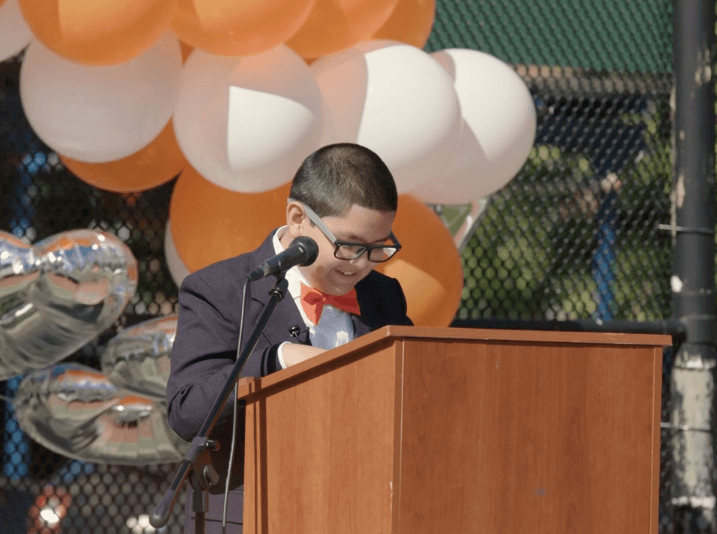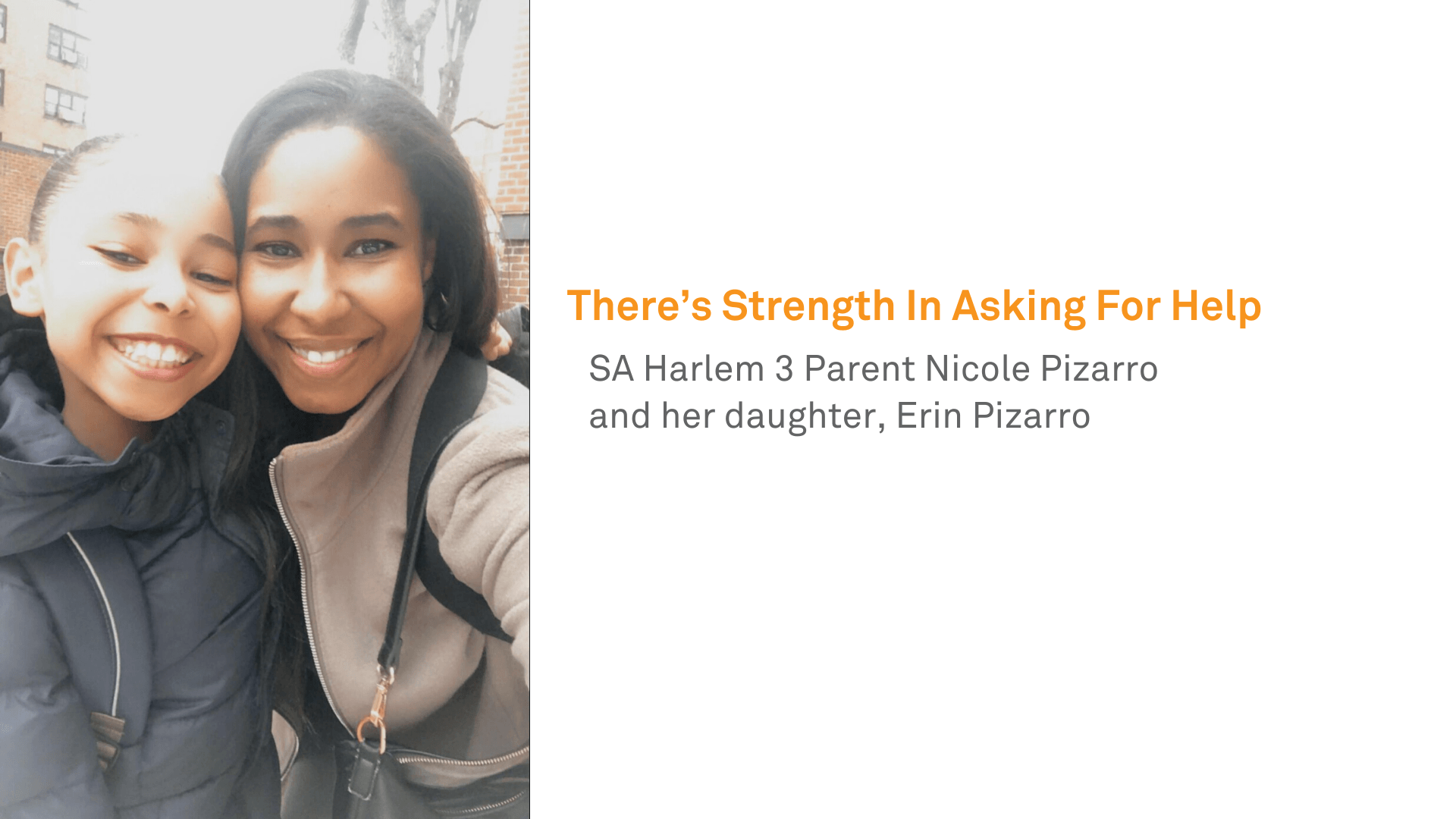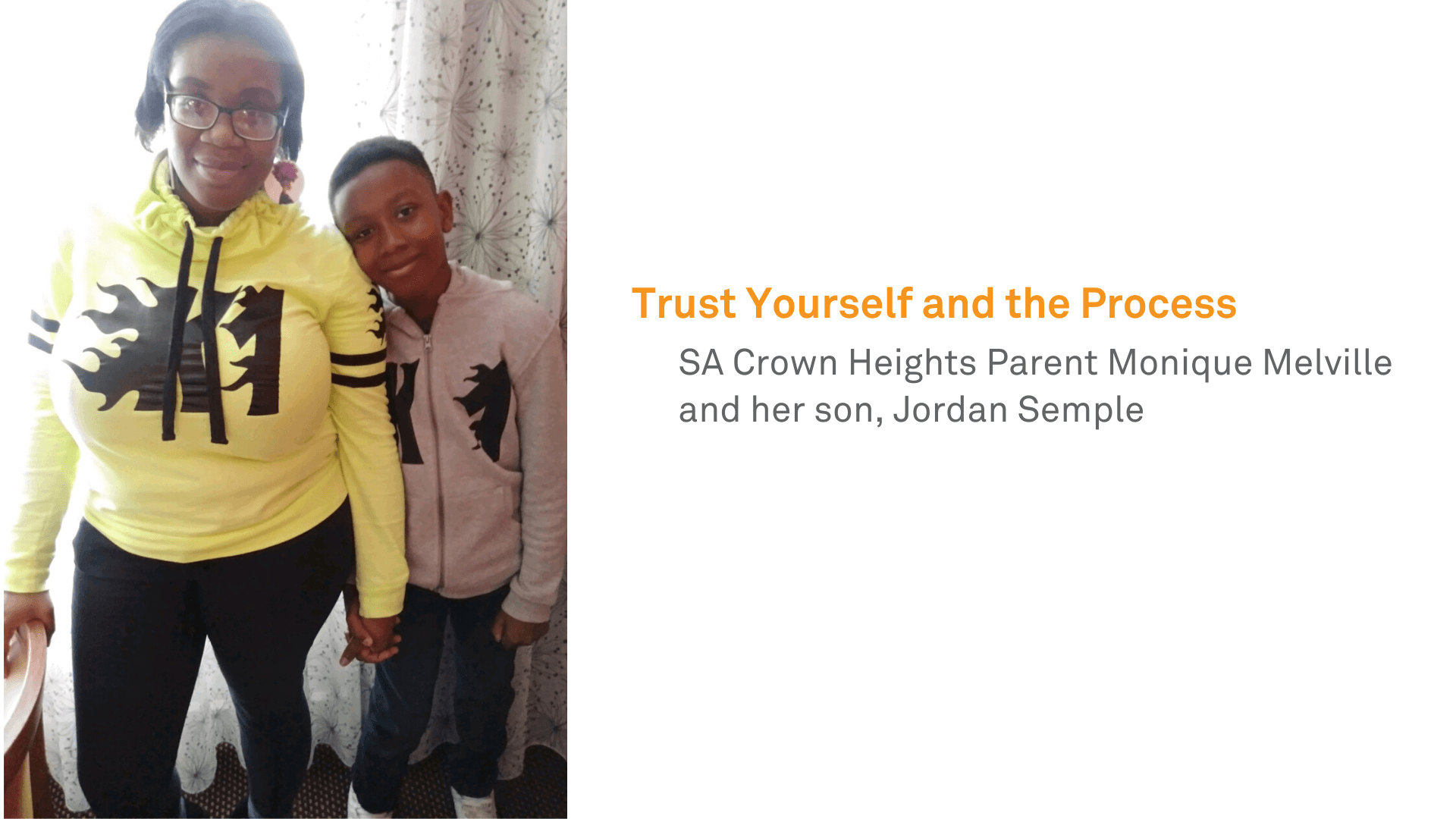
Every scholar has their own educational journey. Some kids are ready for chapter books in kindergarten, while others benefit from more time to master the basics, and then later become avid, passionate readers. Because every child has a unique developmental path, we sometimes advise that scholars skip ahead or take an extra year for intellectual development. But hearing that you need to repeat a grade can feel personal and devastating for both scholars and parents. When SA Harlem 2 scholar Anthony Palma, for example, heard that he needed to repeat the fourth grade, he was so discouraged that he couldn’t move on to middle school with his friends. In the same vein, parents might feel it’s unfair, that SA’s standards are too high, or fear that their child will never catch up. We spoke with three parents who learned that — like Anthony — taking an extra year was exactly what their scholars needed. Watch him share his inspiring message of perseverance here.
 When my daughter Erin was in kindergarten, she was a “lily-padder.” If you don’t know what that means, picture a kid physically leaping from table to table when she’s frustrated. She would scream, climb things, and run around the classroom whenever she couldn’t answer a question.
When my daughter Erin was in kindergarten, she was a “lily-padder.” If you don’t know what that means, picture a kid physically leaping from table to table when she’s frustrated. She would scream, climb things, and run around the classroom whenever she couldn’t answer a question.
When most schools tell you that your child needs to repeat a grade, it feels like they’re dumping a pile of work on your kid and saying, “Good luck! Just re-do the work. Hopefully you’ll get it the second time!” But when Erin’s teacher and principal recommended she repeat kindergarten, they came ready with a plan to support her all year and get to the root of her behavioral challenges. Some of these strategies included giving her positive reinforcement both at home and school — she loved getting to wear her tiara if she stayed on green! — and we worked with her on using her words to express herself and ask for help when she didn’t understand something.
I’d be lying if I said Erin didn’t need time to adjust at first. She wanted to be a big girl in first grade! She didn’t want to leave her friends. As a parent, I wanted to protect her. But I knew it was way more important to be an example for her. In life, I believe that there’s strength in asking for help. Yelling and screaming just won’t work. I’m studying for a degree right now, and whenever I struggle to understand my readings, I’ll say, “See, Erin? Mommy needs help, too. It’s okay. As long as we put in the work.”
Flash forward to the third grade. Erin has no behavioral issues and is mastering her grade level material. She is a ray of sunshine: a bubbly, smiley 9-year old who wants to be a star and loves musical theatre, dance, and drawing. Importantly, instead of crying or throwing a tantrum, she can pinpoint when she’s not understanding the material, and say “Can you help me?”
It doesn’t matter what everyone else is doing. It only matters that our scholars get the help they need, and that parents and the school come together and work hard to do what’s best for them.
“Don’t worry about it.” That’s what my son’s district school said to me when I told them he’d been diagnosed with ADHD at seven years old. Yet somehow, I was worried. Charles never seemed interested in homework and struggled to focus. When I shared my concerns, his school brushed me off: “He’s on grade level,” they said. “He’s fine.”
Fine. Who wants their kid to just be fine? So, I opted for a change, and when Charles started at Success Academy in the third grade, I was shocked to find that they actually listened to me. A few months and a few assessments later, his teacher sat me down and recommended he be evaluated for an IEP. Relief flooded through me. I wasn’t crazy, I thought.
Still, the road ahead was tough. Charles wasn’t where he needed to be academically. He struggled to write comprehensible sentences and understand his reading materials. A few months later, towards the end of the year, his teacher told me that he needed to repeat the third grade.
I’m a busy mom. I work full-time and go to school part-time, but I pride myself on making time for my son. So when I heard this news, my immediate reaction was to feel ashamed and wonder what people would think. Would they think Charles wasn’t smart?
“We’re doing this because we want Charles to take the time he needs,” my principal gently told me. “If we give him time now, we’ll set him up for success later.”
That year, with the constant support of his teacher, school psychologist, and myself, I watched as he began to write legibly and comprehensively, confidently answer questions about his reading homework, and grow from the shy boy who rarely spoke to one who shared his thoughts confidently and frequently.
One day, his teacher called me on the phone. “Charles has something to tell you,” she said. My heart sank, thinking of endless negative possibilities. But it wasn’t negative. Instead, Charles told me that he had jumped three reading levels in just two months. His teacher jumped in to elaborate, telling me that he was a joy to work with, always helping out his classmates. That on that day on the playground, he bravely told his classmates to stop teasing another boy with autism, saying “because we are all different, and that’s okay.”
I’m glad Success Academy didn’t settle for “fine” when it came to my son.

When my son Jordan’s teacher approached me in the spring about him repeating the third grade, my first thought was — am I a bad mom?
I’d known his teacher for a year at that point, and I’d seen Jordan struggle with math and ELA all year. I’d seen his inconsistency with the material — sometimes he’d improve and sometimes he wouldn’t. When you try to do everything for your kid, and then you’re told he has to repeat his grade, all you can think of is, where did I go wrong?
I internally battled with myself. Maybe I should just leave. At another school, he might be on grade-level. Do I want to deal with this? Is this even going to help? Do I really want to put my son through this?
It’s safe to say that my son and I both resisted. When I told him, he cried. He struggled to understand why he couldn’t move up with his friends. But his teacher and principal stayed strong, telling me that it was better for him to take his time now rather than later, and that he would make new friends.
So we took a leap of faith and had Jordan repeat third grade. His teacher and principal became our support system, constantly communicating with me and letting me sit in on Jordan’s classes. They were so positive, lifting him up with words of affirmation daily and encouraging him to work hard. I realized slowly that their recommendation to give Jordan more time was not meant as a punishment for not meeting academic standards — it was made out of love.
Now that he is in fourth grade, I understand even more. He’s exceeding academic standards with flying colors! And I can’t believe I’m actually saying this, but he actually loves math.
If I had to give any advice to parents starting this journey, it would be to trust the process — I can say without a doubt that it really paid off.
After repeating the fourth grade, scholar Anthony Palma scored 100 percent on the Math State Exam, met his goals in ELA, and is now thriving in fifth grade at SA Harlem East Middle School. “Setbacks don’t mean that you fail, or that the game is over. They just mean that you should try harder next time,” he said.










